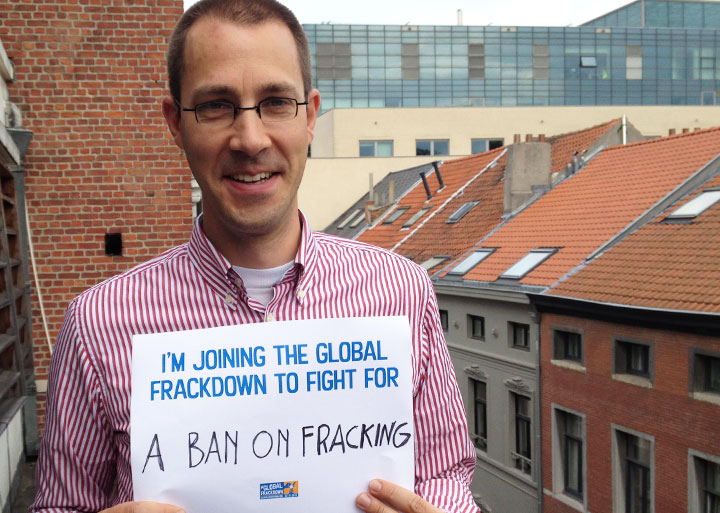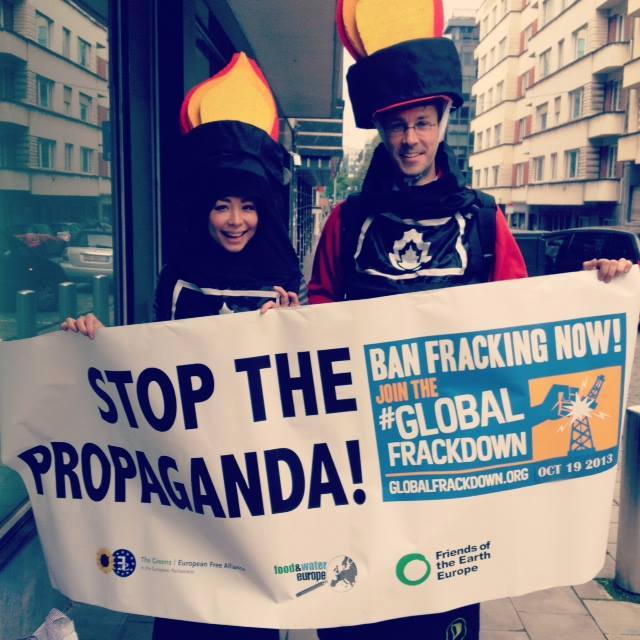Fighting for a Frack-Free Europe
With just two weeks until the Global Frackdown, we called up our colleague Geert deCock in Brussels to get the low-down on Europe’s fight against fracking — the progress that’s been made and the work that still needs to be done. Prepare to be inspired.
By Katherine Cirullo

With just two weeks until the Global Frackdown, we called up our colleague Geert deCock in Brussels to get the low-down on Europe’s fight against fracking — the progress that’s been made and the work that still needs to be done. Prepare to be inspired.
Geert, to start us off, can you tell us a little bit about yourself? Why did you become involved in the fight against fracking?
My name is Geert deCock. I’m Belgian, and I work for Food & Water Watch in Brussels for the European program. My main focus is to campaign for a ban on fracking in Europe and to generally support the groups that oppose fracking in Europe, providing knowledge about fracking, its many harmful impacts and that ways in which we can organize to stop it.
I became involved in the fight against fracking when living in Alberta, Canada (Edmonton), quite close to the tar sands, where I was exposed to a lot of the rhetoric around oil and gas extraction and its “supposed” benefits. That’s when I became politicized about energy and climate and fossil fuels. I saw that there was such a huge gap between what the government was saying about “minimal” risks of tar sands extraction and the real experiences of nations and communities — the very real health impacts tar sands extraction has on people living in those areas and the environment. There’s such a close parallel to fracking where, again, the industry claims the benefits are huge and the risks are minimal, when really, if you talk to the people on the ground, it’s the other way around.
Food & Water Watch is calling for a ban on fracking and an aggressive transition towards renewable energy, all across the globe. Why is it important that communities around the world become involved in this fight, not just those in the U.S.?
Right now in Europe, we don’t have particularly large-scale fracking operations yet. So, it’s important to ban fracking now, before it is too late — before fracking begins and contaminates local water supplies, pollutes the air, industrializes once agrarian communities and really exacerbates global climate change.
Can you tell us a little bit more about the state of oil and gas development in Europe? Currently there are no large-scale fracking operations, but are there any regions or cities threatened by encroaching development?
A couple of years ago, Poland was the big hot spot for shale gas. Sixty percent of shale gas was licensed for shale gas exploration. There was a huge hype about shale gas, but the industry has left because they haven’t found any shale gas.
Now, the next stop for the shale gas industry in Europe is mainly the United Kingdom (UK). Huge areas of the UK have been licensed for shale gas extraction. David Cameron, Prime Minister of the UK, said they’re going “all out for shale,” that it can help climate change. The UK is sort of a ground zero for fracking in Europe. The government is actively pushing for it, but local resistance is enormous. It’s very very strong.
Can you tell us more about this local resistance and some of the communities that have stood up to the oil and gas industry?
In Eastern Romania (in Eastern Europe) the village of Pungesti drove Chevron out. They really occupied the Chevron site for a while, and it was successful. The same thing happened in Eastern Poland, on the Polish-Ukrainian border, in the village of Zurawlow. Farmers there occupied a field for 400 days and ultimately, Chevron left. Chevron also tried to start fracking in Bulgaria, in the most promising and active agricultural land in the country, and again, huge grassroots protests ultimately resulted in a ban on fracking in Bulgaria.
And last year, Cuadrilla Resources, a shale gas exploration company, wanted to do some tests a couple of hours south of London, in Balcombe. Again, a very strong coalition of locals, grassroots activists and environmental groups like Greenpeace and Friends of the Earth held huge protests. Together, they were able to shut down Cuadrilla’s operations. These are just a few examples of how locals have led the charge, and bigger groups have lent their support to achieve bans on fracking.
What are some of these local, grassroots activists concerned about? What are they fighting for?
They’re first concerned with some of the immediate impacts fracking has on the community. In much of Europe, there are pre-existing agricultural or tourism industries — really thriving industries and businesses. The industrialization that fracking might bring to these areas would greatly impact, for the worse, these communties’ ways of life. There are also widespread concerns around water contamination, air quality and health. Emerging evidence from the U.S. shows the public health impacts fracking has on people who live close to a site: the closer you live, the worse the impacts seem to be. So there’s both a local concern for livelihood and wellbeing, and also a concern about the impacts fracking has on the environment, public health and the climate.
The Global Frackdown is coming up on October 11. Do you have an event planned?

Yes, absolutely! I’ve devised a board game called “Fracking Risk.” We will be in front of the European Parliament in Brussels inviting some members of parliament to come play this game with us. The intention of the game is to spread as many bans across Europe as possible. Overall, it’s a clever way to engage with these lawmakers as well as passer-bys who might not be familiar with this movement.
The European Parliament is absolutely key, as it is the only directly elected institution in the European Union and therefore, it is open to listening to citizens’ concerns. In 2012, one-third of European Parliament members voted in favor of a moratorium on fracking.
You know, in Europe, particularly in the eastern region, there are huge concerns about energy security — that we are dependent on imports of gas from Russia. So our main message, particularly this year, and in this context, is that shale gas will not do anything to resolve our dependence on imports. Our goal should be to get off fossil fuels all together — not to depend on LNG imports from places other than Russia.
We want to focus our attention on renewable energy and energy efficiency as the best way forward. This is the only way to address concerns about energy security, and also concerns about climate change, jobs, and health. These [renewables] are the no-regret options, with all of the associated benefits of better air and water quality and so on.
Right now, the European Union is negotiating 2030 climate and energy targets and so, we want to say: shale gas is not an option. Renewable energy is.
Do you have any words of encouragement for communities looking to stand up against the oil and gas industry?
Looking at the experience in Europe, the key message for banning fracking and stopping it from progressing is that this is a winnable fight. It is becoming clearer by the day. The evidence is growing stronger that fracking has a lot of negative impacts on local communities; it threatens our climate and our health. This is a fight that we can win if we mobilize.
Show your support for the Global Frackdown — an international day of action to ban fracking. Sign up to host an event or join one in a town near you: http://www.globalfrackdown.org


